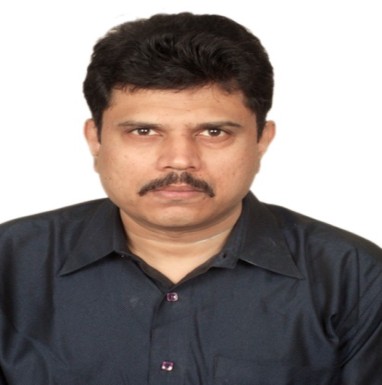8th - 10th July 2022 - Bangalore.

Title: “Channel Magnitude Based Detection for Receive Diversity Amplitude-Shift Keying Systems in Rayleigh Fading”
Abstract: Two low-complexity receivers, namely, the energy detection (ED) receiver and the weighted envelope detection (WENVD) receiver, employing receive diversity, operating in flat Rayleigh fading with multi-level amplitude-shift keying (ASK), and utilizing only channel magnitude information, that is, knowledge of the magnitudes of the fading gains of the receive diversity branches, are considered. The error performance of the ED receiver is analyzed, resulting in a closed form expression for the symbol error probability (SEP). Closed form expressions for the approximate SEPs of the ED and the WENVD receivers for high signal-to-noise ratio (SNR) are derived. The ED receiver is found to have the same diversity order as that of coherent receivers and to perform much better than noncoherent detection, but is also found to maintain the low complexity structure of noncoherent detectors. It is numerically shown that the SEP performance of the ED receiver is much closer to that of a coherent receiver than to that of a noncoherent one. Furthermore, we also consider transmit constellation optimization, that is, optimization of the transmit symbol amplitude levels to minimize the SEP subject to a total energy constraint. Analytical results on the optimization for high SNR and large number of receive diversity branches for the ED and the WENVD receivers are presented. The performance improvement obtained by using these optimal levels over using symbol amplitude levels with equal spacing, that is, in arithmetic progression, for both the receivers is shown through numerical results.
Speaker’s Profile: Ranjan Kumar Mallik is a Professor in the Department of Electrical Engineering, Indian Institute of Technology (IIT) Delhi. He received the B.Tech. degree from IIT Kanpur and the M.S. and Ph.D. degrees from the University of Southern California, Los Angeles, all in electrical engineering. He worked as a scientist in the Defence Electronics Research Laboratory, Hyderabad, India, and as a faculty member in IIT Kharagpur and IIT Guwahati, prior to joining IIT Delhi as a faculty member. His research interests are in diversity combining and channel modeling for wireless communications, space-time systems, cooperative communications, multiple-access systems, power line communications, molecular communications, difference equations, and linear algebra. He is a member of Eta Kappa Nu, and a fellow of IEEE, IE(I), the Indian National Academy of Engineering, the Indian National Science Academy, The National Academy of Sciences, India, Prayagraj, the Indian Academy of Sciences, Bengaluru, The World Academy of Sciences, the West Bengal Academy of Science and Technology, The Institution of Engineering and Technology, U.K., and The Institution of Electronics and Telecommunication Engineers, India. He is a recipient of the Shanti Swarup Bhatnagar Prize, the Hari Om Ashram Prerit Dr. Vikram Sarabhai Research Award, the Khosla National Award (by IIT Roorkee), the IETE Ram Lal Wadhwa Award, the Prof. P. C. P. Bhatt Faculty Research Award (by IIT Delhi), and the J. C. Bose Fellowship. He served as an Area Editor and an Editor for the IEEE Transactions on Wireless Communications, and as an Editor for the IEEE Transactions on Communications. He was a Technical Program Committee (TPC) Co-Chair for the Wireless Communications Symposium of IEEE GLOBECOM 2008 and IEEE ICC 2010, a TPC Co-Chair for the PHY Track of IEEE WCNC 2013, and a TPC Co-Chair for the Communication Theory Symposium of IEEE ICC 2021. He was also the Treasurer of the IEEE Delhi Section during 2005-2006, and served as a member of the IEEE ComSoc Awards Standing Committee during 2015-2017.